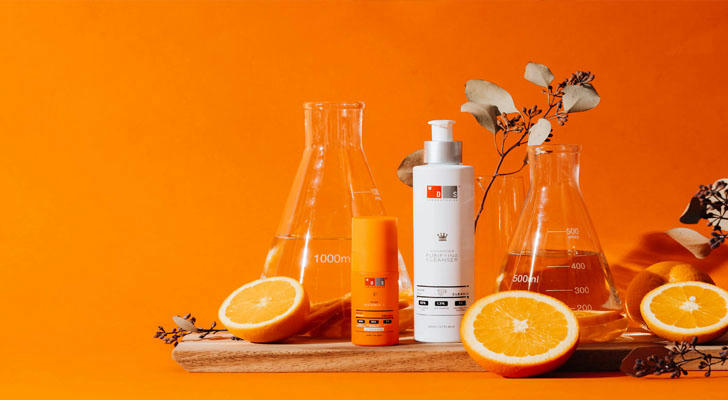Vitamin C for Your Skin: A Global Glow-Up
Vitamin C (ascorbic acid) is more than just a nutrient we get from oranges. When it comes to skincare, this powerhouse ingredient is a must-have, trusted by beauty enthusiasts everywhere. Let’s explore how Vitamin C benefits your skin, why it's popular globally, and how you can easily incorporate it into your routine.

Why Vitamin C?
Vitamin C is a powerful antioxidant that fights free radicals, which are unstable molecules that damage skin cells and speed up aging. It also boosts collagen production, brightens the complexion, and helps repair sun damage. But the real question is: how does it work for different skin issues?
1. Fight Aging with Collagen Boost
One of Vitamin C’s best-known benefits is its ability to boost collagen production. Collagen is the protein responsible for keeping your skin firm and smooth, but it declines as you age. Enter Vitamin C—it helps stimulate collagen synthesis, giving you that plump, youthful look.
Real-World Example:
Take Gigi Hadid’s skincare routine. The supermodel swears by Vitamin C serums for maintaining her radiant complexion. Incorporating Vitamin C has been linked to smoother, more youthful skin, especially when used consistently.
2. Brighten Your Complexion
Do you have dark spots or uneven skin tone? Vitamin C can help fade hyperpigmentation and even out your skin. It works by inhibiting melanin production, which is responsible for dark spots.
Actionable Tip:
If you’re dealing with acne scars or sun spots, try a Vitamin C serum in the morning. Look for products that contain stable forms of Vitamin C, such as ascorbic acid or sodium ascorbyl phosphate. Apply after cleansing and before moisturizing, and always follow with sunscreen.
Real-World Example:
Kylie Jenner, known for her flawless skin, has often credited Vitamin C as a key part of her skincare routine to brighten her complexion and fight off dullness.

3. Sun Damage Repair & Protection
While Vitamin C isn’t a substitute for sunscreen, it can help protect against and repair UV damage. By neutralizing free radicals from sun exposure, it reduces the formation of wrinkles and dark spots.
Pro Tip:
Pair Vitamin C with your sunscreen for maximum effect. Research shows that when used together, they provide an extra layer of defense against UV-induced skin damage.
Real-World Example:
Many dermatologists recommend combining Vitamin C with SPF daily, especially after a summer of sun exposure. Dr. Dennis Gross, a dermatologist, has formulated several Vitamin C serums that are designed to be layered with SPF for optimal sun protection.
4. Soothing and Reducing Inflammation
If you struggle with acne, rosacea, or general redness, Vitamin C’s anti-inflammatory properties can help calm and soothe the skin. It not only helps reduce the redness but also fights acne-causing bacteria.
Actionable Tip:
For those with acne-prone skin, choose a Vitamin C product that’s gentle and non-comedogenic (won’t clog pores). Try a Vitamin C serum formulated for sensitive skin, or a Vitamin C-enriched face mask once a week to give your skin a gentle, healing boost.
Real-World Example:
Zendaya, who has struggled with acne in the past, uses products that incorporate Vitamin C to keep her skin clear and calm. Vitamin C’s ability to reduce inflammation has been one of the reasons she’s become a fan of the ingredient.

How to Use Vitamin C: A Simple Routine
Now that you know the benefits, let’s break down how to incorporate Vitamin C into your routine.
Morning:
Start with a Vitamin C serum after cleansing. This ensures that the antioxidant can go to work before any other products. Follow with a moisturizer and, crucially, sunscreen.Evening:
If you’re using Vitamin C in your evening routine, apply it after cleansing and before moisturizing. While it’s not absolutely necessary to use it twice a day, consistent morning use will give you the best results.
Choosing the Right Vitamin C Product
When selecting a Vitamin C product, look for:
- Concentration: Opt for 10-20% as it’s effective yet gentle on the skin.
- Packaging: Vitamin C degrades in light and air, so go for products in opaque, air-tight packaging.
- Form: Ascorbic acid is the gold standard, but derivatives like sodium ascorbyl phosphate or ascorbyl glucoside are great for sensitive skin.

Conclusion: A Global Skincare Staple
Whether you live in the sun-drenched beaches of Los Angeles or the cool, misty mornings of London, Vitamin C works wonders for all skin types. From reducing dark spots to fighting aging and boosting radiance, it’s a simple yet effective solution. So, if you haven’t already, it might be time to add Vitamin C to your skincare routine for that coveted glow-up.
By addressing specific issues like acne scars, sun damage, and fine lines, Vitamin C has earned its place as a global skincare hero. With just a few steps, you can harness its benefits and achieve healthier, glowing skin—no matter where you are in the world.
